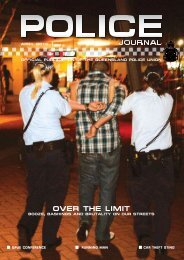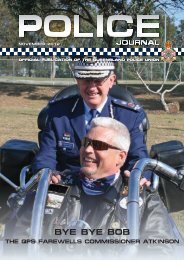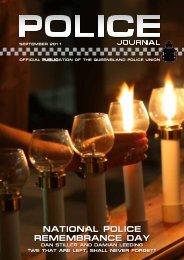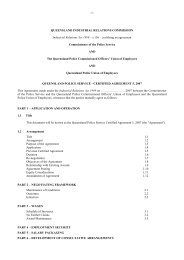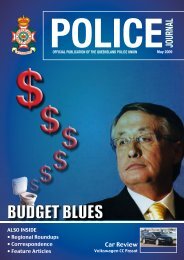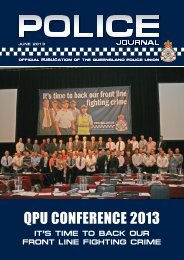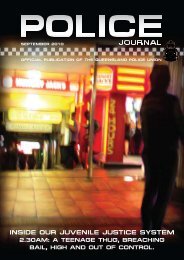Ph 3259 1900 (24 hours) - Queensland Police Union
Ph 3259 1900 (24 hours) - Queensland Police Union
Ph 3259 1900 (24 hours) - Queensland Police Union
You also want an ePaper? Increase the reach of your titles
YUMPU automatically turns print PDFs into web optimized ePapers that Google loves.
<strong>Police</strong> Health<br />
<strong>Police</strong> Health<br />
by Peter Shanahan, <strong>Police</strong> Health Chairman<br />
CONFUSED ABOUT WEIGHT<br />
LOSS?<br />
With so many diets out there<br />
promising the best weight loss<br />
method, it can be confusing for those<br />
trying to lose weight to figure out what<br />
you should and should not be eating.<br />
What’s important to note is that what<br />
works for one person may not work<br />
for another. This article will look at the<br />
basic facts to get you started.<br />
If you are thinking about losing weight<br />
or starting a new exercise program,<br />
it pays to see your doctor or health<br />
professional first. Your doctor will<br />
check if you have any underlying<br />
health conditions that may affect your<br />
weight loss attempts or approach to<br />
weight loss.<br />
THE FACTS AND FIGURES<br />
Purely as a guide, one kilogram of<br />
body fat contains about 7,700 calories,<br />
or about 32,000 kilojoules. This is the<br />
amount of energy you will need to<br />
burn or forego to lose one kilogram of<br />
fat.<br />
It’s presumably safe to burn 0.5kg to<br />
1kg of fat per week. The easiest way<br />
to accomplish this is to reduce calorie/<br />
kilojoule intake, and increase exercise.<br />
Rather than cutting out 1,100 calories<br />
per day, it is easier to reduce your<br />
daily food intake by 500 calories and<br />
exercise (burning 600 calories). After<br />
7 days you’ll reach the 7,700 calorie<br />
reduction.<br />
To work out energy (Cal/KJ) in food,<br />
read labels, go online, or buy a<br />
reference book. The Department<br />
of Health and Ageing has created a<br />
helpful site called the `Healthy Weight’<br />
website: www.healthyactive.gov.au<br />
There are also plenty of free apps<br />
and other websites. You don’t need to<br />
spend a fortune.<br />
If you just try to dramatically reduce<br />
your calories, your body might hinder<br />
your weight loss efforts, because<br />
it may think you are going into<br />
starvation, and may try and hang onto<br />
fat (energy stores). So why make it<br />
harder for yourself?<br />
Exercise is beneficial not just for<br />
losing weight, but also for general<br />
health, so eating well and exercising is<br />
a win/win.<br />
ARE ALL CALORIES THE SAME?<br />
Dietician Australia recommends eating<br />
a variety of fresh foods of all colours<br />
to make sure you get all the vitamins<br />
and minerals essential for a healthy<br />
body. It is easier to keep weight off<br />
and maintain a new eating plan if you<br />
make real food choices rather than<br />
substitutes.<br />
The vitamins, minerals, and fibre<br />
in nutritional whole foods play an<br />
important part in both your energy<br />
levels and how you feel. Fibre will help<br />
fill you up and keep your body regular<br />
in getting rid of waste products.<br />
If you limit your variety of foods, you<br />
are likely to miss out on important<br />
vitamins and minerals, and no doubt<br />
you will get bored with eating the<br />
same thing over and over. This will<br />
only make it harder to stick with your<br />
diet.<br />
You should aim to develop sensible<br />
eating habits that are easy to relax<br />
once you reach your goal weight,<br />
without going back to old bad habits.<br />
SET YOURSELF REALISTIC GOALS<br />
Don’t be fooled into thinking it is<br />
possible to lose the ten kilos a week<br />
shown on reality TV shows. They don’t<br />
show the contestants exercising for<br />
five-seven <strong>hours</strong> a day with personal<br />
trainers, while on extremely low<br />
energy diets. They are also monitored<br />
by doctors <strong>24</strong>/7. This is not realistic for<br />
us who have work and life to get on<br />
with.<br />
If you are losing more than a kilo a<br />
week, it is also quite possible that it is<br />
not pure fat but water weight (where<br />
your body has been retaining water),<br />
or even muscle wastage if you are not<br />
fueling your body with the right food.<br />
www.mydr.com.au has some handy<br />
tools including a weight calculator for<br />
what weight range is healthy for you.<br />
WHEN YOU LOSE WEIGHT, WHERE<br />
DOES THE LOST BODY FAT GO?<br />
Fat is basically stored energy.<br />
Your body converts fat to usable<br />
energy for your muscles and other<br />
tissues through a series of complex<br />
metabolic processes. This causes<br />
your fat cells to shrink.<br />
These metabolic activities also<br />
generate heat and waste products.<br />
These waste products - water and<br />
carbon dioxide - are excreted in your<br />
urine, faecal matter, and sweat, as<br />
well as being exhaled from your<br />
lungs.<br />
To help with the process of<br />
eliminating waste products, make<br />
sure you drink enough water,<br />
particularly if you are exercising.<br />
Drinking water will also help you<br />
feel full when dieting, because<br />
dehydration is often confused with<br />
hunger.<br />
In summary, balance your energy<br />
intake with energy output. Choose<br />
foods and eating patterns that<br />
help reduce your calorie intake<br />
and combine this with physical<br />
activity that you find enjoyable and<br />
sustainable. Take a long-term view,<br />
70<br />
<strong>Queensland</strong> <strong>Police</strong> <strong>Union</strong> Journal July 2012



